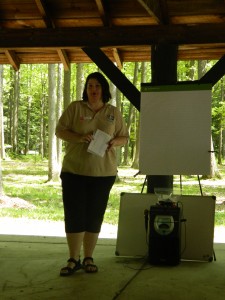
PENFIELD – Nature Abounds presented their first Forest Summit, which will become an annual event, yesterday at SB Elliott State Park.
The speakers at the Forest Summit were: John Hecker, District Forester, Pennsylvania Department of Conservation and Natural Resources; Edward Frank, member of the Native Tree Society; Melinda Hughes-Wert, President of Nature Abounds; Ted Stroter, retired Chemical and Environmental Safety Engineer; and Brian Oram, B.F. Environmental Consultants, Inc.
President of Nature Abounds Melissa Hughes-Wert discussed climate change and Pennsylvania. She explained how Pennsylvania’s climate has already begun to change in noticeable ways. There are many things that are affected by the climate change such as the temperature and weather, landscapes and water, wildlife, agriculture, recreation and health.
“One of the things about climate change is that it’s a big unknown,” Hughes-Wert said.
Because the Great Lakes didn’t ice over, the water evaporates into the air and because we are located on the east side of that it is coming down heavier, Hughes-Wert explained.. Sometimes we’re going to see heavier snow fall, sometimes heavier rainfall, but whatever part you’re in, you’re going to see more of it.
Pennsylvania will develop a climate similar to current-day southern Virginia by the end of the century, Hughes-Wert said, with a worst-case scenario of a climate similar to current-day Alabama.
“Plants and wildlife will move north to cooler climates to start to adapt,” Hughes-Wert said. An important plant at risk of moving out of range is Mountain Laurel, the state flower. Warming climate and shifting distributions and quality of forest habitat is expected to cause changes in bird life. Species at great risk include the ruffed grouse, white-throated sparrow, magnolia warbler and yellow-rumped warbler. Population of the ruffed grouse, the state bird is declining in its southern ranges from the Georgia mountains to Pennsylvania. Decline in the American beech tree will affect the ruffed grouse, their favorite food being beechnuts, Hughes-Wert explained.
Things are going to pollinate earlier and longer, which is going to do a lot for respiratory systems, Hughes-Wert said. There will be more cases of asthma and allergies, and there are going to be longer seasons.
“You just have to do your part to help slow things down,” Hughes-Wert said. “It could be as simple as changing a light blub, or driving less.”
Other important topics covered throughout the day were: Forest Health and the Moshannon State Forest, Old Growth Forests, Endangered Species Day and World Turtle Day, Marcellus Shale Drilling and Air Quality and Groundwater and Surface Water Issues in Pennsylvania.
Nature Abounds launched their citizen volunteer opportunity, Keepers of the Forest. This will engage citizens in protecting and cleaning the local forest and rural areas. Keepers of the Forest will give opportunities to educate and involve citizens about basic forest health and preservation. Planned activities include:
- wildlife identification, mapping, and biodiversity studies
- invasive species maintenance and native plantings
- monitoring of disease spreading insects such as the Pine Bark Beetle or the Emerald Ash Borer
- identifying and marking abandoned gas and oil wells
- outreaching to campers on ways to reduce their impact on the forest
- monitoring for and the clean-up of unwanted trash dumping sites.
There are other volunteer opportunities such as Watch the Wild. Choose a location to observe whether it be a specific site, like your backyard, a nearby water body, or park. Another opportunity is IceWatch USA, which is a seasonal opportunity of Nature Abounds, brings you the opportunity to help scientists study how our climate is changing. Choose a water body to observe whether it be a pond on your property, a lake at a local park, or a near-by river. There is also the opportunity to join Pennsylvania Senior Environment Corps (PaSEC) are groups of senior volunteers, aged 55 and up across Pennsylvania, that perform tasks for the good of the environment. For example, PaSEC volunteers monitor water quality, mark abandoned oil and gas wells, restore trails, and educate the public about the environment.
Any questions about Nature Abounds, upcoming events and volunteer opportunities can be directed to Nature Abounds at 814-765-1453 or info@natureabounds.org. Their website is also available at: www.natureabounds.org.